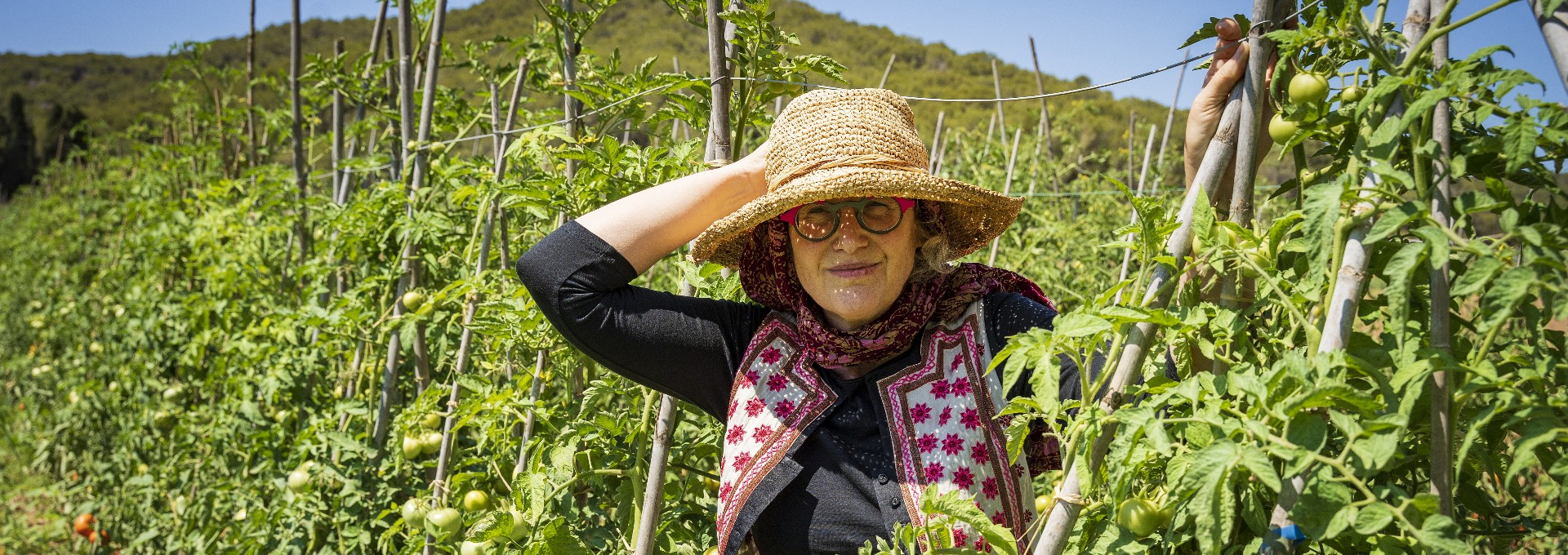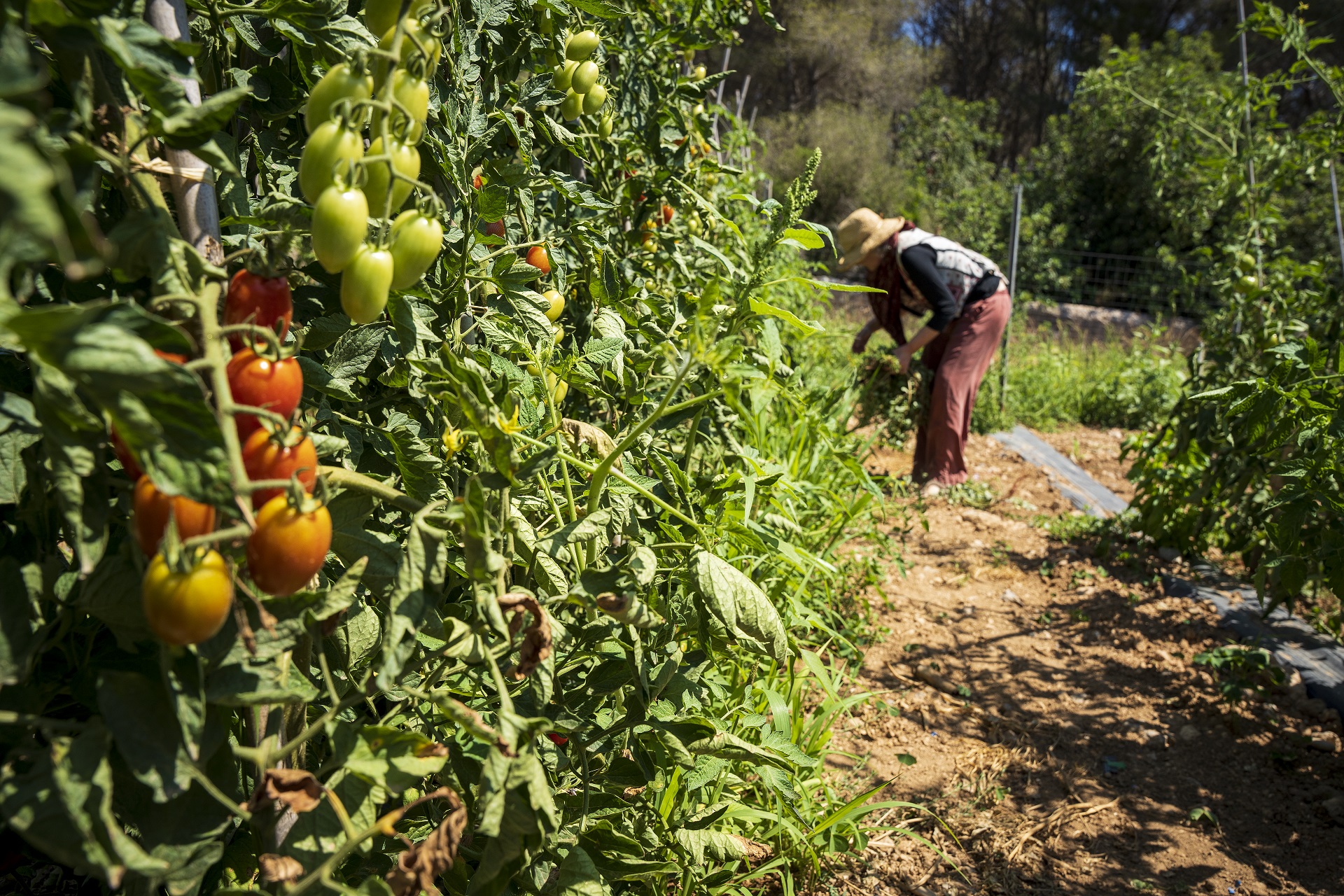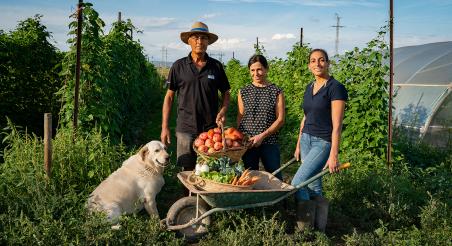Can Girona is one of the few remaining farms in the Garraf area that maintains traditional agricultural activity so close to the sea. Agnès Zander (Barcelona, 1967), who runs the farming business, tells us that most of the farmhouses in the area have been sold or operate as rural tourism businesses, but she’s bucking the trend.
Surrounded by Mediterranean forest and vineyards, the farm is currently certified by the Catalan Council for Organic Agricultural Production (CCPAE). The farm’s 60 hectares comprise 30 hectares of Aleppo pine forest (in the past – in Roman times, for example – it was populated by holm oaks and oaks), 27 hectares of vineyards and three hectares of organic vegetable gardens.
Agnès decided to open a farm shop in which to sell her own produce and that of other local organic farmers, cutting out intermediaries. She explains that Sències Can Girona practices what she refers to as “land culture” and that the family business has always been committed to keeping alive the old traditions of her grandparents and great-grandparents. However, the business is currently exploring ways to strike the right balance between food production, commitment to the land and operating as a going concern.
When Agnès Zander was 18 years old, her grandfather asked her what she wanted to study. When she replied that she was making up her mind between art and biology, her grandfather pulled no punches in his reaction: “You’ll die of hunger doing art.” He suggested studying biology or agronomy. That very afternoon, Agnès decided to leave the family business far behind and embark on a different kind of life. She moved to New York, where she explored fascinating worlds related to art and education. However, she wasn’t earning much, so when her grandfather died, in 2012, she joined the family business. As the Catalan saying goes, it was a feeling of “Roda el món i torna al Born” (“Travel the world and return to El Born”) . She found farming interesting at first, but quickly realised that something was amiss: despite owning three farms, the business was losing money. It dawned on her that the model that had worked until then was no longer viable.
We sit down with Agnès at the entrance to the farmhouse to learn about the history of Sències, its relationship with the land and farming, and the ideas brewing at Can Girona for taking care of the land. Sències also runs two other farmhouses: Can Pous (Abrera) and Can Massana (Masquefa).
You come from farming stock but you chose a different career path right from the start. How did you end up coming back to farming? What led you to reconnect with the land?
Motherhood made me feel my connection with the land before I returned to the world of farming. I think that being a mother has taught me unconditional love and the importance of being present in every moment, no matter what happens. I’ve developed patience and persistence through motherhood: I believe that if I’d gone straight from being an artist to a farmer, I wouldn’t have been able to acquire these qualities.
Taking up the Can Girona project again was like having a second son or daughter, as it requires persistence and presence. It’s not a nine-to-five job but rather it’s about maintaining that vital connection. We’re our children’s guardians, aren’t we? Well, I feel the same connection with the farmhouse and the 60 hectares that surround it.
So you relate the family project to the much broader social mission of looking after the land.
Yes, because it’s the same as what you do with your children: they don’t belong to you, but you have to be there, nurturing and protecting them. In the same way, looking after the land is like being the guardian of an asset which doesn’t belong to you but which you must take care of so that other people and future generations can enjoy it.
«Looking after the land is like being the guardian of an asset which doesn’t belong to you but which you must take care of so that other people and future generations can enjoy it» Agnès Zander
How do you consider new generations in your commitment to looking after the land?
You can’t adopt a short-term approach to looking after the land. In the West, we admire native cultures a lot because they’re strongly connected to the land. Some have been able to hold out and haven’t been sucked into the capitalist system. Generally speaking, they have an awareness of time that stretches across at least ten generations. I like the intergenerational approach we’ve adopted in the family business, thinking two or three generations ahead. It’s an extremely powerful approach, and it’s the complete opposite of what normally happens: companies think four years ahead at the most.
Is it difficult to change the work dynamics and principles of farming businesses?
Very! But I think that my experience of coming to farming from a totally different world and with a fresh perspective has been really helpful. I wasn’t afraid to ask about things that until then had been considered obvious, or to question answers along the lines of “It’s always been done this way.” If we’ve been doing things one way all our lives and we realise we’re dying, maybe it’s time to change...
The process of change is slow, as it involves two generations and several people who have to agree, but it’s really exciting to see that, little by little, we’re getting there.
Once you rejoined the family business, what idea did you propose?
We did a pilot test here, at Can Girona, where all of us – children and grandchildren – have spent some of our childhood and where my grandfather also lived. We have a strong connection with this place and love it deeply, as well as the land around it. We realised that if we worked the land, we wouldn’t be able to run the farmhouse. So when we heard that the Can Pere cooperative was losing the land it had been cultivating for 20 years and was looking for a new home, we offered it our land. The cooperative works the land and we buy the food it produces, in order to sell it in the farm shop.
Does the direct sales model work well?
I opened the shop in order to be able to control prices and not have to sell to wholesalers, since I didn’t trust intermediaries. But then, when I started working in the shop, I realised that intermediaries were not the leeches I thought they were. I had to step out of my art world and come back down to earth. As I always say, I’ve learned to be a calçot [Catalan green onion], to peel away that layer of prejudice.
Unfortunately, after ten years of hard work, we’re struggling to stay afloat financially. The numbers in the accounts were healthy until 2020, but due to the post-Covid regulations we ended up with no customers, and then the price hikes came. Right now, we’re not competitive with the prices of our produce, so we’re thinking of closing the shop and proposing that Can Pere sell directly to customers.
Before Can Pere took over the cultivation side of things, was all your produce organic?
Yes, except for the grapes. In 2012 we started leasing the vineyard to a farmer. He’s almost seventy years old and he’s a professional in the [viticulture] sector. He gives us a percentage of the year’s harvest, which I think is very fair, because in a bad year he pays less, and in a good year he pays more. These farming practices are what make the system work.
The problem we have in Catalonia is that the estates and farms tend to be smallholdings. In the Penedès region, it’s said that 40 hectares of vineyards are needed to sustain a family. When I was little, my mother tended to the vineyards and we produced farmhouse wine. Then we stopped making it and began selling our grapes to the big wineries, such as Torres or Freixenet. Until around the year 2000, the farm could sustain itself by selling its grapes to wineries. But when you’re a smallholding, you don’t have a free market and the wineries set the price for you. This is one of the problems with farming, which is a highly volatile and risky activity because it depends on the weather. I’m talking about traditional farming here, not the agrifood industry. Qualities and yields change depending on rainfall and weather conditions over the course of the year, especially in the case of grape vines.
Could cooperation among farmers be a way to shift farming away from a purely mercantile approach?
Yes. In fact, at Can Girona we’re trying to move away from this competitive, Darwinian model based on the survival of the fittest towards one that’s underpinned by cooperation. One of my go-to thinkers on this topic is the biologist Lynn Margulis, who championed a cooperative, interdependent view of the earth. I’d like to believe that we’re increasingly aware that we form part of an ecosystem and that it’s important to take care of it. Because if the ecosystem fails, what will we do then?
«I’d like to believe that we’re increasingly aware that we form part of an ecosystem and that it’s important to take care of it. Because if the ecosystem fails, what will we do then?» Agnès Zander
Generational renewal in family farming businesses is often fraught with difficulties. Have you thought about who might continue your work as guardian of this land?
I don’t own this place; I just have a 4% stake. We’re a family business. When my grandfather died, he left it to six children and 13 grandchildren. The shift from having a single owner to having 19 of them was extremely positive, because it forced us to reach agreements and build together. My son, for example, is 18 years old now and says he doesn’t want to continue the business, but we’re doing everything we can to avoid breaking this relationship with the land, despite the financial difficulties and losses.
What advice would you give to someone who’s thinking about whether or not to continue with a family farming business?
I’d tell them to be free. I don’t believe there are any recipes; if there are any, they’re a simplification of life. If you feel you want to continue with the family business, go for it. And if you don’t feel you want to, don’t do it. Personally, I want my son to be free to choose his own path. When he tells me he doesn’t want to live in the farmhouse and prefers to live in Barcelona, I think back to when I was his age and also wanted to live in a big city. In fact, I travelled much further afield, to New York.
My mother died recently and she told me that she was very proud that I, the rebel of the family, was running the farmhouse and the family business. So you never know what might happen.
Given the economic difficulties affecting farming, several initiatives are in place to facilitate the diversification of sources of income, such as education, rural tourism or cultural activities. What approach do you plan to follow in order to keep going despite the losses?
We’re considering the possibility of diversifying our activity by incorporating rural tourism, but without losing the essence of what we call “practising land culture”. In other words, we’re thinking of opening our house while maintaining farming activity, even if we’re not doing the farming ourselves. We want to create a space for bonding, community and connection in which to convey our approach, rather than just renting out a place to spend a holiday.
The contract we have with Can Pere stipulates that they have to continue the organic cultivation of the land and that our future guests will be able to visit the fields, connect and collaborate with us. At the moment, we’re trying to move towards regenerative agriculture and I also want to create an edible forest. I’ve spent two years trying to sort out the funding and, if Can Pere agrees, we’ll go ahead with the project. This is the last transgenerational decision I’ll make, because you don’t plant a forest for yourself or your children but rather for your grandchildren. These actions complete our vision. We want them to be more than just words; we want to turn them into reality by planting the seeds and making them grow.
If you could teach everyone in the world a skill, what would it be?
Being able to stop. It’s important not to take any action without first taking a deep breath and listening, not only to words but also in order to perceive the complexity of the ecosystem. It’s really dangerous to take actions without listening, however good your attitude is. Sometimes the best course of action is to do nothing. Another piece of advice I’d give would be to connect with nature and listen to it a lot. In winter, for example, nature takes a break and it’s worth pausing and turning inwards. Let’s take the chance to listen to ourselves.
What makes you despair and what gives you hope?
What makes me despair, as many farmers have probably already told you, is the labyrinthine complexity of bureaucracy. It’s crazy! I don’t doubt for a second that those who work in public administration want the best for the country, and I don’t believe that there are any conspiracies or bad faith, but there is a failure to listen and a major disconnect. Sometimes laws are passed with the best of intentions, but penalties prevail over fostering a connection with enthusiasm and awareness. Everything is built on the basis of punishment, and that kills human desire. The fact that regulations are based on fear rather than co-creation makes me despair.
But what gives me hope is getting up every morning in this wonderful setting, realising that we have everything we need and that we can invent, create and learn. Although I’m 56 years old and my partner has turned 67, we’re both excited to discover that learning never ends, and that the most powerful source is the one within us.
Coming back to the land has given me awareness, which, although an overused word, points to the most powerful aspect of human beings, in my opinion. Over time I’ve realised that the land doesn’t need us: there are fantastic ecosystems here that function on their own, the animals are wonderful, and the plants even more so. Everything ticks along on its own; we humans are the only element that endangers this harmony. Yet at the same time, it’s amazing that human beings have the ability to gain awareness and change their attitude. There’s nothing that excites me more than becoming aware of the source of this interdependence and taking responsibility for everything I think, say and feel. It’s a source of continuous learning, providing us with a greater capacity for transformation. Another person I greatly admire, Nelson Mandela, managed to bring about enormous change from a tiny cell in which he was locked up for 27 years.
«What gives me hope is getting up every morning in this wonderful setting» Agnès Zander
Do you think your work looking after the land is appreciated by society?
Yes. In fact, I remember the emotion I felt on the first day of the pandemic when I saw a long queue of people coming to shop here. At that moment, I was with Carles, the farmer who cultivates the fields, and I remember him looking at me and saying “I feel so happy! I feel appreciated!”
Over those weeks, the world came to a standstill, and people really appreciated shopping at a farm. Unfortunately, all of that changed after the pandemic.
Do you consider it a privilege to be able to eat what you grow?
More than a privilege, it’s hugely beneficial for one’s health. I have to admit that I find it very difficult to buy food elsewhere, as we’ve got some excellent vegetables. I love to experiment and create new dishes. In fact, I’ve been thinking about taking the business in a new direction by incorporating some sort of culinary activity! Little by little...
— BCN Smart Rural Editorial —




